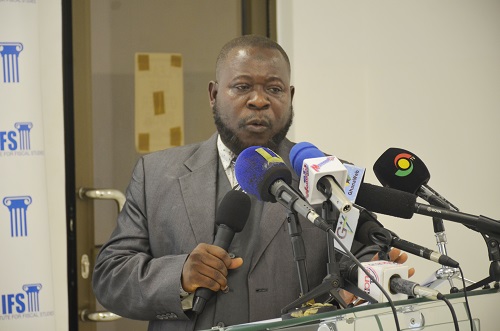
The government must initiate measures to shore up its revenue generation from the extractive sector to address the financial challenges facing the country, the Institute of Fiscal Studies (IFS) have suggested.
According to the fiscal think tank, the extractive sector held a lot of prospects in terms of revenue generation.
Senior Research Fellow of IFS, Dr Said Boakye, made this known at a press conference to present an IFS’ assessment of the economy and the 2022 Mid-Year Budget review in Accra on Tuesday.
The Senior Research Fellow of IFS indicated that between 2015 and 2018, the country’s extractive sector recorded $22.72 billion worth of minerals.
However, Dr Boakye said only $1.48 billion, representing 6.5 per cent of the total value produced, was paid as revenue to the government.
“This means that the private producers in the mining sector, took $21.24 billion, representing as large as 93.5 per cent of the total value of minerals produced during the period,” he said.
“ Put differently, out of the total super normal profit of $14.14 billion that accrued to mineral production in Ghana from 2015 to 2018, the government of Ghana received only 10.5 per cent as its revenue from the mining sector, while 89.5 per cent of the supernormal profit went to the private producers,” DrBoakye said.
The Senior Research Fellow of IFS, said comparatively, the government of Botswana was able to collect about 52 per cent in revenue of the total value of minerals produced in the country and about 95per cent of the supernormal profit accrued to mineral production in Botswana.
DrBoakye urged the government to adopt the measures put in place by the Botswana government in order to generate more revenue from the country’s extractive sector.
That, it said would help create more fiscal space and successfully consolidate Ghana’s fiscal position.
“Extractive sector revenues should not be allowed to go into private pockets while the government wallows in borrowing,” it explained.
On the country’s growing debt, the IFS suggested that the government should first reduce borrowing by cutting the waste and combat corruption in the public sector.
“The government should therefore ensure that corrupt and wasteful officials are quickly and severely punished to deter others whilst addressing the ongoing macroeconomic instability,” it said
Dr Boakye further suggested that government should follow the example of Zambia and renegotiate with its creditors for debt restructuring as it would help minimise the debt service expenditure, at least in the short term.
That, he said, would grant the government some breathing space while it pursued long-term policies to improve the fiscal position of the country.
BY KINGSLEY ASARE




